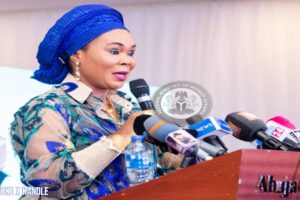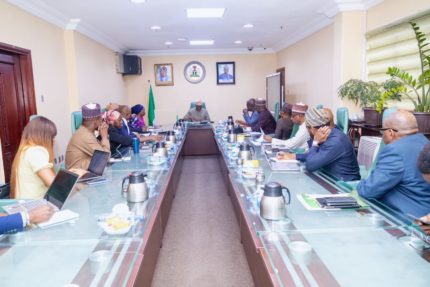On Monday morning, the Honourable Minister of Finance and Coordinating Minister of the Economy, Mr. Wale Edun, spearheaded a critical meeting aimed at advancing President Bola Tinubu’s directive for the Nigerian National Petroleum Corporation Limited (NNPCL) to sell crude oil to local refineries in Naira. This bold initiative is designed to fortify the domestic economy by ensuring that oil transactions, particularly with local refineries like the Dangote Refinery, are conducted in the national currency. The move is anticipated to significantly support the sustainable operations of these refineries and reduce the reliance on foreign exchange, which has historically strained Nigeria’s financial system.
The meeting brought together key stakeholders from various sectors, reflecting the collaborative approach necessary to implement such a significant policy shift. Among the notable attendees were Senator Heineken Lokpobiri, Minister of State for Petroleum Resources (Oil); Mallam Mele Kyari, Group Chief Executive Officer of NNPCL; Dr. Zacch Adedeji, Executive Chairman of the Federal Inland Revenue Service (FIRS); and Mrs. Lydia Jafiya, Permanent Secretary of the Ministry of Finance. Their presence underscored the high level of coordination and commitment required to successfully transition the crude oil sales process to a Naira-based system initiated by President Tinubu
Collaborative Efforts and Stakeholder Engagement led Mr Wale Edun
During the meeting, the Honourable Minister Wale Edun emphasized the importance of stakeholder collaboration in overcoming the longstanding challenges within Nigeria’s petroleum sector. He noted that the transition to selling crude oil in Naira is not just a financial adjustment but a strategic move to stabilize the country’s economy and enhance the operational efficiency of local refineries. The stakeholders engaged in in-depth discussions, focusing on the technical, operational, and regulatory aspects of this directive. The participants acknowledged the complexities involved, particularly concerning currency conversion, pricing mechanisms, and the potential impact on the broader economy.
Mr. Wale Edun expressed strong confidence in the ability of the assembled team to navigate these challenges. He highlighted the necessity of aligning the goals of the NNPCL, the Ministry of Finance, and the Federal Inland Revenue Service to create a seamless and effective implementation framework. Mr Wale Edun also stressed that this initiative aligns with the broader economic reforms being pursued by President Tinubu’s administration, aimed at bolstering local industries and reducing Nigeria’s dependence on imports.
Implications for the Nigerian Economy and Petroleum Sector
The decision to sell crude oil to local refineries in Naira is expected to have far-reaching implications for the Nigerian economy. Firstly, it is likely to reduce the pressure on Nigeria’s foreign reserves, as the need for foreign exchange to purchase crude oil will diminish. This could lead to a more stable Naira and potentially lower inflation rates, providing much-needed relief to the Nigerian populace. Furthermore, by supporting local refineries, the policy could enhance Nigeria’s refining capacity, reduce fuel imports, and increase the availability of petroleum products domestically, contributing to energy security.
Additionally, the move is anticipated to boost the profitability of local refineries by protecting them from the volatility of foreign exchange markets. This, in turn, could encourage further investment in Nigeria’s petroleum sector, both from domestic and international investors. The strategic meeting led by Mr. Wale Edun marks a significant step towards achieving these goals, reflecting the government’s commitment to implementing policies that promote economic stability and growth. As the discussions continue, the success of this initiative will depend on the effective collaboration of all stakeholders and the government’s ability to address the inherent challenges of such a transformative policy.
Strengthening the Domestic Economy through Naira Crude Sales
The decision to sell crude oil to local refineries in naira is a critical part of President Tinubu’s economic agenda, aimed at reducing the dependency on foreign currency for essential transactions within the oil sector. By conducting these sales in naira, the government intends to bolster the local currency and reduce the pressure on Nigeria’s foreign reserves. This approach is expected to create a more stable economic environment, enabling local businesses to thrive without the volatility associated with foreign exchange fluctuations.
During the meeting, Wale Edun emphasized the importance of this initiative for the broader economy, noting that the use of naira for crude oil transactions would help stabilize the currency and support local industry growth. The initiative is also geared towards enhancing the efficiency and sustainability of local refineries, including the much-anticipated Dangote Refinery, which is expected to play a pivotal role in Nigeria’s energy sector.
However Minister Wale Edun Should moves is expected to rejig the economy and relief Averages nigerians pains of economic hardship associated with subsidy removal
Table of Contents
Discover more from OGM News NG
Subscribe to get the latest posts sent to your email.














